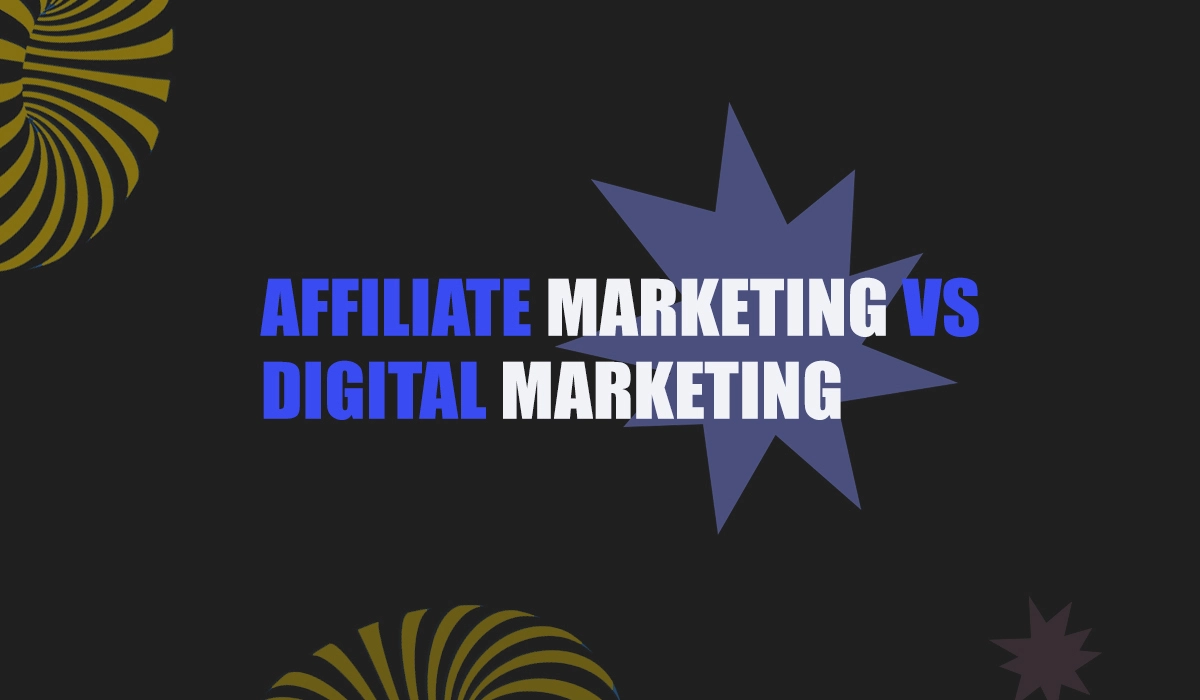Building a business requires strategic decision-making, especially when choosing a marketing approach. Among the top strategies, digital marketing vs affiliate marketing often sparks debate among entrepreneurs. Both methods offer unique advantages, but which is more profitable for your business?
Whether you’re a beginner exploring affiliate marketing in digital marketing or a business owner evaluating digital vs affiliate marketing, understanding the differences between these two strategies is key to maximizing profits. This article compares digital marketing and affiliate marketing approaches to help you make an informed choice.
Table Of Contents
What Is Digital Marketing?
Digital marketing uses various online channels to promote products or services, such as SEO, social media, email, and PPC ads. Unlike affiliate marketing in digital marketing, this strategy focuses on a business marketing its own offerings directly to customers.
How Digital Marketing Works
- Identify your target audience through research and analytics.
- Use diverse channels like email campaigns, social media ads, and content marketing.
- Monitor performance using tools to track engagement, traffic, and conversions.
- Optimize campaigns to improve results and ROI.
Pros of Digital Marketing
- Wide Reach: Targets a broad audience across multiple platforms.
- Complete Control: Businesses manage branding, pricing, and messaging.
- Real-Time Insights: Analytics tools allow for immediate adjustments.
Cons of Digital Marketing
- Ad Blocking: Some customers avoid ads, reducing visibility.
- Higher Costs: Requires upfront investment in tools, ads, and expertise.
- Technical Barriers: Skills like SEO and data analysis are essential.

What Is Affiliate Marketing?
Affiliate marketing is a performance-based model where businesses collaborate with affiliates (bloggers, influencers, or marketers) to promote products in exchange for a commission. Affiliates act as intermediaries between product owners and customers, driving sales through unique referral links.
How Affiliate Marketing Works
- Affiliates join a program like BizzOffers, and receive referral links or codes.
- They promote products using blogs, social media, or ads.
- Customers click the links, triggering tracking systems to monitor their actions.
- Affiliates earn commissions based on successful referrals—often a percentage of the sale.
Pros of Affiliate Marketing
- Low Cost: Minimal startup investment is needed.
- Scalability: Affiliates can expand by promoting multiple products.
- Passive Income: Earnings continue as long as referral links drive sales.
- Accessibility: Many programs offer training, making it beginner-friendly.
Cons of Affiliate Marketing
- Limited Control: Affiliates rely on product owners for quality and pricing.
- Income Fluctuations: Earnings depend on consistent traffic and sales.
- High Competition: Standing out requires unique strategies.
Digital Marketing and Affiliate Marketing: Key Differences

Both affiliate marketing vs digital marketing are effective promotional strategies, but they differ significantly in their approach, purpose, and execution. Let’s explore what sets them apart.
Digital Marketing vs. Affiliate Marketing: A Comparison Table
| Aspect | Digital Marketing | Affiliate Marketing |
| Definition | Using various online channels to promote a business’s products or services. | A performance-based model where affiliates promote others’ products for a commission. |
| Purpose | Build brand awareness, engage with the audience, and drive sales. | Generate sales or leads for a business through affiliate referrals. |
| Ownership | Businesses own and market their own products or services. | Affiliates promote products they don’t own. |
| Compensation Model | Businesses pay for ads (e.g., PPC, impressions) or invest in organic strategies. | Affiliates earn commissions only for successful referrals (e.g., sales or leads). |
| Target Audience | Broader audience with varied interests, focusing on brand building and conversion. | Niche-specific audience aligned with the affiliate’s content. |
| Cost Structure | Requires upfront investment in campaigns, tools, and expertise. | Low startup cost—affiliates only need promotional platforms. |
| Control | Full control over messaging, pricing, and campaigns. | Limited control over product pricing, quality, or inventory. |
| Tracking Metrics | Tracks website traffic, engagement, conversion rates, and ROI. | Tracks clicks, sales, and conversions via affiliate links. |
| Scalability | Scalable but requires significant resources (team, budget, tools). | Highly scalable as affiliates can promote multiple products simultaneously. |
| Risks | Higher financial risk due to upfront costs and evolving algorithms. | Lower financial risk but dependent on product owners’ quality and reputation. |
| Brand Visibility | Ensures direct brand exposure and consistent branding. | Limited to the affiliate’s promotion style and platform. |
| Campaign Duration | Often long-term, focusing on building customer loyalty and sustainable growth. | Typically short-term, targeting immediate sales or leads. |
| Revenue Model | Revenue depends on the effective use of marketing channels. | Affiliates earn a share of the revenue based on performance. |
| Audience Interaction | Businesses interact directly with customers via email, social media, and more. | Affiliates act as intermediaries, connecting brands and customers. |
Profitability Factors: Breaking Down the Numbers
When comparing profitability between digital and affiliate marketing, several key factors come into play. The profit potential varies based on your business model, resources, and expertise.
For digital marketing, profits depend on campaign optimization, audience targeting precision, and the value of your products or services. With affiliate marketing through platforms like Facebook, profitability hinges on commission rates, conversion efficiency, and traffic volume.
Revenue Models Compared
Digital marketing typically generates revenue through direct sales of products or services. The business keeps 100% of each sale but bears all marketing costs. This model works best for companies with high-profit margins or lifetime customer value.
In contrast, affiliate marketing splits revenue between the merchant and promoter. Merchants pay commissions only on confirmed sales, while affiliates can earn from multiple products simultaneously. This creates a win-win situation where both parties share the financial benefits of each sale.
Cost Structures: Investment vs Returns
The initial investment differs significantly between these marketing approaches. Here’s what you can expect:
- Digital marketing costs include content creation, ad spend, software tools, and potentially staff salaries.
- Affiliate marketing requires minimal upfront investment—primarily your time and basic promotional tools.
- Digital marketing ROI builds gradually but can become more profitable long-term as brand equity grows.
- Affiliate marketing offers faster returns but with narrower profit margins per sale.
Scaling Your Business: Which Model Grows Better?
Both models offer scaling potential, but through different mechanisms. Digital marketing scales through channel diversification and audience expansion, requiring proportional increases in budget and resources.
Affiliate marketing scales horizontally—by adding more products to promote or vertically by focusing on higher-commission items. The ability to leverage other people’s efforts makes affiliate marketing exceptionally scalable with fewer resources.
Time to Profit: Short-term vs Long-term Results
The timeline to profitability varies between these marketing approaches. Affiliate marketing often delivers faster initial returns, with some affiliates seeing commissions within days of starting promotion.
Digital marketing typically requires more time to build momentum but creates sustainable growth patterns. Businesses might wait months to see positive ROI from SEO efforts or content marketing, but once established, these channels continue generating value without proportional cost increases.
Risk Assessment: Where Your Money Is Safer
Financial risk differs significantly between these marketing strategies. The risk factors include:
- Digital marketing carries higher upfront risk due to significant initial investment with uncertain returns.
- Affiliate marketing presents minimal financial risk as you pay only for confirmed results.
- Digital marketing faces algorithm changes and market saturation risks.
- Affiliate marketers risk commission structure changes or program terminations.
Ideal Business Types for Each Marketing Model
Not all businesses benefit equally from each marketing approach. Understanding which model aligns with your business type can maximize your marketing effectiveness.
Digital marketing works best for businesses with unique products, strong brand identity, or complex services that require detailed explanation. Examples include SaaS companies, luxury brands, and professional service providers.
Affiliate marketing excels for businesses with established products, good commission margins, and broad appeal. E-commerce stores, subscription services, and digital product creators often see excellent results with affiliate programs.
Combining Strategies for Maximum Profit
Many successful businesses don’t choose between digital marketing and affiliate marketing—they implement both. This hybrid approach capitalizes on the strengths of each strategy while offsetting their weaknesses.
For example, use digital marketing to build brand awareness and customer trust, then leverage affiliate partnerships to expand reach and drive additional sales. This combination creates multiple revenue streams and diversifies marketing risk.
Case Studies: Success Stories in Both Fields
Successful companies demonstrate the potential of both marketing approaches. In digital marketing, brands like Dollar Shave Club used viral video content to build a subscription empire worth billions. Their direct digital marketing efforts created massive brand recognition and customer acquisition.
In affiliate marketing, platforms like Wirecutter (now owned by The New York Times) built a business model entirely on product recommendations and affiliate commissions. Their trusted reviews generate millions in affiliate revenue annually, proving the scalable potential of this model.
Choosing the Right Approach for Your Business Goals
The ideal marketing strategy depends on your specific business objectives. Consider these factors when making your decision:
- Available budget and resources
- Timeline for desired results
- Product type and profit margins
- Existing audience and brand recognition
- Your marketing expertise and available time
For startups with limited budgets, affiliate marketing offers a low-risk entry point. Established businesses might benefit more from comprehensive digital marketing campaigns that build long-term brand equity.
Read, also – Best Affiliate Marketing Niches for Success
Conclusion
When deciding between digital marketing vs affiliate marketing, there’s no universal winner. Each approach has its strengths, and the best choice depends on your resources, target audience, and business objectives.
Evaluate your goals carefully and consider blending both strategies for maximum profitability. Whether you’re a business owner or an aspiring entrepreneur, understanding the difference between digital marketing and affiliate marketing opens up endless possibilities to grow your brand and earnings.



